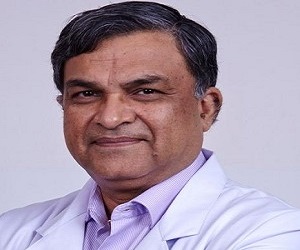About Dr. Ajay Kumar Kriplani

Dr. Ajay Kumar Kriplani is a renowned surgeon in India specializing in laparoscopic and gastrointestinal surgery. With over 35 years of expertise, he pioneered laparoscopic surgery in India, introducing advanced techniques and procedures. He holds the distinction of being the first surgeon in India to perform laparoscopic adrenalectomy, splenectomy, and live donor nephrectomy for kidney transplant. Dr. Kriplani has received international recognition, including the prestigious Dr. S.R. Joglekar Award and Dr. N. Sethuraman Oration. He has also contributed significantly to the education and training of laparoscopic surgeons across India and neighboring countries.
Qualification
- MBBS
- MS
Work Experience
- HOD, Fortis Memorial Research Institute, Gurgaon
- Director, Indraprastha Apollo Hospital, New Delhi, 2015
- Senior Resident, AIIMS, New Delhi
Specialties
- Bariatric and General Surgery
- Laparoscopic Cholecystectomy
- Laparoscopic Hernia Repair
Award
Dr. Ajay Kumar Kriplani has been honored with the prestigious Dr. S.R. Joglekar Award and Dr. N. Sethuraman Oration.
Treatment
- Bariatric Surgery for Weight Loss
Similar Doctors
View All Top Doctors
Similar Hospitals

View All Top Hospitals
FAQ
Ans 1: Bariatric surgery is a procedure performed to help individuals with severe obesity lose weight by reducing the size of the stomach or bypassing part of the digestive system. Suitable candidates for bariatric surgery typically have a body mass index (BMI) of 40 or higher or a BMI of 35 or higher with obesity-related health conditions such as type 2 diabetes or high blood pressure.
Ans 2: The common types of bariatric surgery procedures include gastric bypass, sleeve gastrectomy, adjustable gastric banding, and biliopancreatic diversion with duodenal switch. Each procedure has its benefits and considerations, and the choice depends on individual health needs and goals.
Ans 3: After bariatric surgery, individuals are required to make significant lifestyle changes, including adopting a healthy diet, engaging in regular physical activity, attending follow-up appointments, and adhering to recommended supplementation to prevent nutritional deficiencies.
Ans 4: While bariatric surgery is generally safe, it carries potential risks and complications like infection, bleeding, blood clots, leaks at surgical sites, nutritional deficiencies, gallstones, and dumping syndrome. However, the risk of complications can be minimized by following post-operative instructions and attending regular follow-up appointments
Ans 5: The recovery time after bariatric surgery varies depending on the type of procedure performed and individual factors. In general, patients may stay in the hospital for a few days after surgery and gradually resume normal activities within a few weeks to months. However, full recovery and weight loss results may take several months to a year.
Ans 6: While bariatric surgery is typically considered permanent, some procedures like adjustable gastric banding can be reversed if necessary. However, reversal procedures are complex and may not always restore the stomach to its original state. It’s essential to discuss the potential for reversal with a bariatric surgeon before undergoing surgery.







